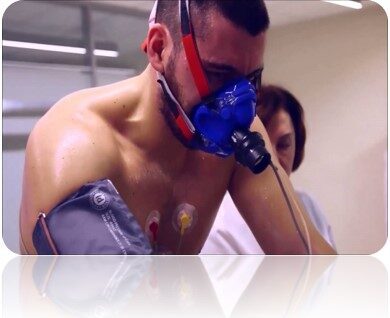Cardiopulmonary Exercise Test (CPET)
What is a Cardiopulmonary Exercise Test (CPET)?
Cardiopulmonary Exercise Testing (CPET), also commonly referred to as VO2 testing, provides key information relating to your cardio-pulmonary health and function. The testing includes collectively assessing your heart, lungs, wider vascular system, muscles and metabolism. Results are used for related medical diagnostics or to further optimize fitness and performance. Where required, the CPET test may be carried out alongside a Stress ECG (at the same time) for further data on the electrical activity of your heart.
How should I prepare for the Cardiopulmonary Exercise Test?
Before the procedure, to achieve the most accurate results please note the following requests:
- Wear comfortable, loose fitting clothing and avoid belts or girdles that may make it harder for you to breathe. Women should wear bras.
- Wear comfortable, flat shoes that will not slip off while you are cycling or on the treadmill.
- If you smoke, avoid smoking for at least eight hours before testing.
- Do not eat for two hours before the test, light amount of water is permitted before the test.
- Ideally you should not exercise vigorously, 24 hours before the test, but if really needed you may do light exercise 2-3 hours prior procedure.
- Do not take your short acting inhalers such as Salbutamol (Ventolin), Terbutaline (Bricanyl), Ipratropium bromide (Atrovent) or Ipratropium bromide and Salbutamol Sulphate (Combivent) for four hours before the test.
- If you are taking beta-blockers – please notify us in advance so we can advise you on what do to before testing.

Please tell us about any temporary or permanent condition that could affect your ability to move, walk, bear weight, or keep your balance. If possible, discuss this when you are first scheduled for the test. It is also important that the staff conducting the test have this information. Try to be as well rested as possible. You may need to reschedule the test if you feel unwell (for example, if you have a cold). If you do not feel you can give your maximum exercise effort, contact our clinic.
What happens during the Cardiopulmonary Exercise Test?
- Your heart rate and rhythm, your blood pressure, breathing rate, oxygen consumption, and oxygen saturation (finger or forehead probe) will be checked during the test. There will be a doctor and nurse present throughout your test.
- You will ride or move on the treadmill, for a few minutes as per the protocol as a warm-up. Following the initial stage – the bike (resistance) and treadmill (speed) will increase progressively.
- It is important that you describe anything you feel as you exercise. If you become short of breath, we may ask you to rate it as, mild, moderate or severe. If you have chest discomfort, you will be asked to describe it as best you can and rate it on a scale of 1 to 10 (1 is very mild; 10 is very severe). This helps the staff know how you are doing and gives us a better way to compare how you feel before and after the test.
- Keep riding the bike or walking/running on the treadmill until you are told to stop or until you are too short of breath to continue or are physically exhausted. We may stop the test if your oxygen saturation drops to low levels or the ECG shows signs of heart strain. We will be constantly monitoring everything to make sure you are safe.
- For CPET, during the recovery stage, you have to keep cycling / walking as the load is taken off the bike / treadmill. Do not jump off the treadmill. While you rest, your breathing, heart rate and oxygen level will continue to be monitored.
- For the CPET Stress echo, the treadmill will be stopped abruptly and will ask you to lay quickly on the bed so the Cardiologist can immediately capture your heart function while the heart rate is still on the higher side.
Could there by a problem during or after the Cardiopulmonary Exercise Test?
- Problems are rare during or after a CPET, but occasionally it can cause chest pain. You could also have some palpitations or dizziness. The staff are trained to deal with any problems, but a doctor is always available who can check you if the staff think it is necessary.
- After you leave the clinic, if you have any chest pain that last more than 15 minutes, or if any GTN spray/ tablets you have do not relieve the pain, you should call us or dial 999.
What happens after the Cardiopulmonary Exercise Test?
- You can eat and drink as usual. Depending on how you feel, you may go about your normal routine or take it easy if you feel tired.
- Please remember, our staff are here to help you. If you have any questions about the test, please ask.
